INDUSTRYINCLUSIVITY
Small changes,big impact
Are you deaf aware? JESS WATTS explores how nail salons can better accommodate clients with varied hearing needs
september 20-26th is
International Week of the Deaf
, celebrating and acknowledging the deaf community and individual experiences of deaf people.
According to the Royal National Institute for Deaf People (RNID), one in three adults in the UK are deaf, have hearing loss or tinnitus, while an estimated 1.2 million adults have hearing loss ‘severe enough that they would not be able to hear most conversational speech’. As deaf people make up such a large proportion of society, it could be assumed that accessibility and understanding are both prevalent, but this is not always the case.
Nail salons are quintessential examples of social environments, often seen as places to enjoy conversations and interactions, while receiving treatments. However, for many deaf people, salons can create anxiety and unease due to a lack of understanding and accommodation. As Scratch has previously noted, only 4% of beauty and personal care companies worldwide cater for people with physical disabilities.
Terminology: explained
‘Deaf’ with a capital ‘D’ refers to individuals who identify as culturally Deaf and part of the Deaf community, often using sign language as their principal means of communication.
When describing people with different levels of hearing loss, ‘deaf’ with a lowercase ‘d’ is used as a more general term. To be ‘deaf aware’ is to acknowledge the experiences and culture of deaf individuals, while understanding communication needs to promote inclusivity and respect.
For more information, visit www.signhealth.org.uk
The UK Equality Act 2010 requires ‘reasonable adjustments’ to be made for both deaf employees and clients so they are not put at a ‘substantial disadvantage’. The RNID notes that ‘failure to do so could be unlawful discrimination’.
THE CLIENT PERSPECTIVE
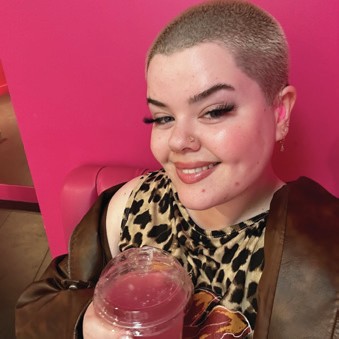
Kirsty Jade
Kirsty Jade is a Deaf Gen Z creator, advocate & podcaster who is a campaigns and policy officer at SignHealth, a deaf health charity. She uses her platform on Instagram – @thatdeafgirlkj – to create content centred around accessibility, identity and lived experiences.
“A deaf person going to a nail salon may feel anxiety before entering,” Kirsty shares. “I mentally prepare myself for questions such as: ‘what nail shape would you like? What colour? What design do you want created?’ There have been times when I’ve avoided going to nail salons because I don’t want to deal with the communication barriers.”
Kirsty describes her ‘mixed experiences’ at salons, observing the importance of deaf aware businesses. “In my old hometown, I had a nail tech who was really accommodating. She made sure that I could read her lips and repeated things,” she continues. “After I moved, I struggled to find another suitable tech – so for years, I would go to nail salons feeling anxious and sometimes leave with a nail finish that I didn’t ask for or like.” For a salon to truly be accommodating of deaf people, communication should be clear and the environment should match the needs of the individual.
Kirsty points nail salon owners towards Chris Laing, a Deaf architect who discusses how lighting and colour schemes can affect deaf people’s experiences of conversation and communication, alongside the acoustics of a room. “Background noise, like music in nail salons, can often be a challenge, especially while techs are talking,” shares Kirsty. For more information on Chris Laing’s research, scan here.
The importance of an accommodating salon experience cannot be overstated. Kirsty adds: “Recently, I found an amazing deaf aware nail tech who is local to me: Ayra Anderson. She’s so attentive to my needs and asks whether I want music played, and to tell her if it’s too loud. She also doesn’t wear a mask when talking so that I can understand her.”
@thatdeafgirlkj
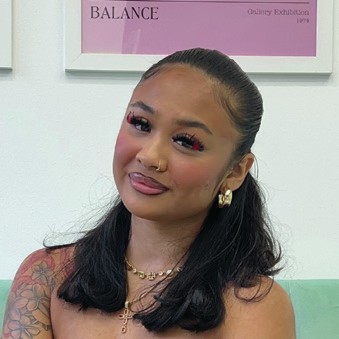
Ayra Anderson
THE TECH PERSPECTIVE
Ayra Anderson of Ayra’s Atelier is a nail artist based at Kyoko Nails in Sale, Greater Manchester. She started her beauty career in 2023, revealing that she spent every penny she earned on a nail course, which ‘completely changed’ her life.
Early in her nail career, Ayra worked with a deaf client. She says it was this appointment that made her realise how important accessibility is for deaf people. Since then, she has made sure to incorporate accessibility within her services, as ‘people from all walks of life’ will sit in her chair.
Ayra shares that her approach to accessibility is largely down to communication. The first thing she does is try to gain an understanding of each client’s deafness. “I think it helps the client realise that their experience with me will be completely personalised and accessible,” Ayra shares. “I make it clear that nothing is ever too much trouble.”
When she first met Kirsty Jade, Ayra viewed her social media posts to gain an understanding of what she advocates for. Ayra comments: “What better way to learn than from a person who is seeking genuine change and striving to make a difference in the world?” Since working with Kirsty, Ayra says she feels ‘very strongly that there needs to be more education for nail techs on accessibility’. She adds: “Salons cannot change their customer service to be more accessible if they don’t know how or where to start. Most nail courses do not cover this area, and I think it should be essential.”
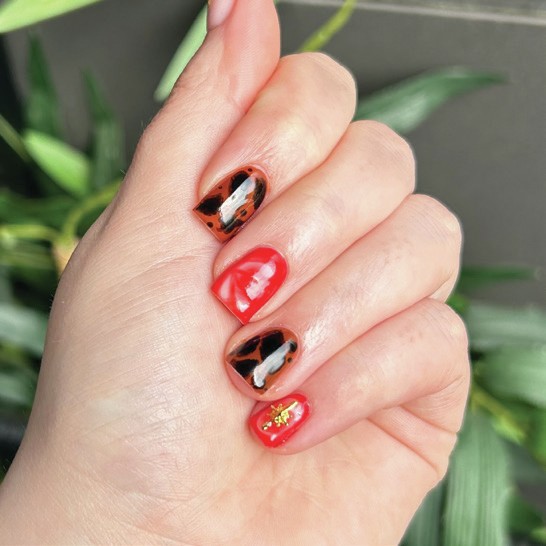
A nail design for Kirsty Jade by Ayra.
“I mentally prepared myself to tell Ayra I was Deaf when I arrived at my first appointment,” shares Kirsty Jade. “I was so happy when I opened the door, and she was already so
attentive and brought up me being Deaf before I could. She asked me if I wanted the music off, I said yes, and she switched it off. She was eager to know more about my experiences of being Deaf. She’d had a deaf client before who shared deaf awareness tips with her, and I appreciated that she’d taken note.”
@ayras_atelier.x
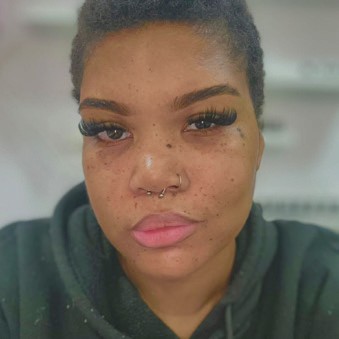
Keren Mingole
TECH TALK
Keren Mingole of Nail & Glow Studio, Glasgow, is a deaf nail tech, and believes there should be greater awareness of the needs of deaf people. She uses her phone to communicate with clients, but suggests that others learning basic sign language would be a step in the right direction, such as how to sign ‘how are you?’. “Businesses should also consider fire alarms that flash, as this alerts deaf people to issues and indicates that they are accommodated and cared for,” she shares.
Keren acknowledges that being deaf has made it challenging to secure clients, but suggests to techs in similar situations: “Don’t give up, keep pushing through. Be sure to ask for help via deaf communities.”
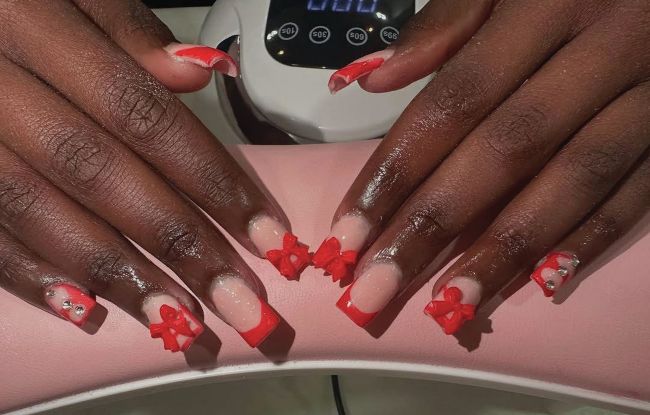
Nails by Keren Mingole.
@nailandglowstudio
How to make your nail space more accessible
Ayra Anderson shares how she has made her salon experience more accessible to deaf clients, thanks to insights from Kirsty Jade:
• Removing her face mask while talking or wearing a transparent face mask when working.
• Lifting her mask when speaking to clients so they can lip read, and speaking slowly and clearly, without being patronising.
• Investing in a dust collector that has a quiet mode to keep noise to a minimum. This means clients don’t have to contend with loud sounds.
• Not playing music from a phone or speaker.
• Asking clients if they need doors or windows closed to minimise noise.
• Making clients aware if there is a potential for loud noises, so they are not taken by surprise. This is particularly important as sounds can be amplified for those wearing hearing aids.
Having implemented these actions, Ayra is working on a document that shares how to accommodate deaf clients. It will be free to all service providers to access. “My goal is not only to advise the nail community on how to be more inclusive, but raise awareness of the lack education in this area and make positive changes,” she says.
Kirsty adds: “Accessibility education should be factored into beauty courses. Inclusivity should be in curriculums and course materials. I suggest reaching out to deaf clients and professionals in the beauty industry to improve accessibility within salons and services. We know what deaf access looks like and can tell you what you need to be doing.”
Ayra encourages members of the nail industry to work with compassion and understanding. “We’re incredibly lucky that our job is to make individuals feel beautiful,” she shares. “Every client deserves that feeling.”
The RNID offers support for businesses and organisations via its website, to help ensure workplaces are fully inclusive for staff and customers who are deaf or have hearing loss. Visit www.rnid.org.uk or scan here.